PM on Australia Immigration Deal | Detention Centres | West Papua
PM Post-Cabinet Press Conference - 11 Feb 2013
By Mark P. Williams
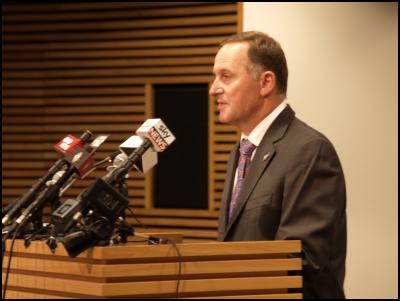
The PM began today's press conference by talking about his bilateral meeting with Australian Prime Minister Julia Gillard over the weekend. He described it as "very useful" and talked about the strength of the CER agreement between Australia and New Zealand, saying it was a crucial factor in increasing the New Zealand economy's competitiveness.
He spoke about adding to the existing aspects of the agreement by limiting how much Australian and New Zealand consumers pay to use their mobile phones in each other's countries, saying there is no need for people to have "astronomical bills" for using their mobile across the Tasman. He then added that Australia and New Zealand had also agreed to provide $3m of matched funding towards the identification of a potential vaccine for Rheumatic Fever.
He then spoke about immigration saying that New Zealand had agreed to take 150 asylum seekers from Australia each year as part of its pre-arranged refugee quota of 750. He said, "boat people are a regional problem; in other words, they are our problem as well as Australia's", adding "it's only a matter of time til we have a mass arrival here in New Zealand".
He then went on to say: "They are not queue-jumpers. They have to be genuine refugees assessed under the UNHCR criteria".
He outlined the plans for the week ahead, including the continuation of debates in the House on the Prime Minister's Statement, and to progress the Corrections Amendment Bill and the Privacy Information Sharing Bill. The Prime Minister then took questions from the press gallery.
Questions to the Prime Minister
The PM was asked why New Zealand was taking on these refugees to Australia and what New Zealand stands to gain from the arrangement. The PM responded that he had done the deal because he thought it was the right thing to do. He then said that in processing refugees Australia has huge resources to spend stopping refugees from boarding boats to set out to Australia and that New Zealand could "piggy-back" on those resources and consequently benefit from closer ties with the Australian system. He then said that he also viewed it as New Zealand helping "our mates" and also benefitting from Australian intelligence regarding proposed mass migration and people-trafficking. The PM added that there had been occasions where the Australian authorities had been in situations where they were debating whether to "shepherd a boat across the Tasman".
The PM was asked whether the deal would stick if there was a change of government in Australia. He responded that he was "pretty comfortable" that the deal would go ahead regardless.
The PM was asked whether he thought that this deal meant New Zealand was endorsing the conditions of Australian off-shore detention centres. He responded that the Julia Gillard was confident that the camps operating within the Australian system meet the world standard for refugee camps. He was asked to clarify what was meant by "within the Australian system" and indicated that it referred to those in Australian territory.
The PM was then asked about using Australian off-shore detention centres for processing mass arrivals bound for New Zealand. He indicated that he had considered the possibility.
The PM was asked whether he was concerned that he might be sending "a wrong signal" to people-traffickers. He said that it was necessary to recognise that desperate people were doing desperate things and he considered this to be an appropriate response.
The PM was asked whether Australia would be "receptive" to taking on New Zealand "mass arrivals" and whether he would be happy with that situation. He responded by saying, that Australia had indicated they would. He added that he accepted that it is general held to be unlikely that New Zealand would receive "mass arrivals" but that "that was exactly what the Canadians said until a boat turned up" and he was "only reacting to the stream of advice" which he "constantly receives".
The PM was asked why New Zealand did not build a detention centre of its own if that was really the case. He responded by saying that the government was in the process of "spending a lot of money" at Mangare to upgrade it for just such a purpose.
The PM was asked when Australia said to him that they would consider "shepherding" a boat across the Tasman. He responded by saying that there was "a long standing history of a boat that was looking to come", adding that if people refuse to "get off the boat" they cannot be forced to disembark and the intercepting authorities have to decide whether to support their journey.
The PM was asked if Australia had pressurised New Zealand into taking these refugees. He strenuously denied that Australia had been "trying to heavy us". He added that, from the intelligence he regularly received from Australian sources, the likelihood of boats seeking to come to New Zealand was "very alive" and he had been "dealing with it just before Christmas".
The PM was then asked if he could reveal more about what was being done at Mangare. He said that he could not really reveal more.
Following on from this, the PM was questioned about his earlier statements [30 April, 2012], when putting forward the Immigration Amendment Bill, when he stated the government was not intending to build a detention centre in New Zealand. He replied, "Well, we're not; we've got Mangare and we're going to revamp it."
Returning to the question of refugees reaching New Zealand by boat, the PM was asked about the instance before Christmas and whether he had information that a boat was on its way. He said that Yes, he had received information "sourced by the Australian system" but in that case it either "fell over" or something was done to prevent it.
It was pointed out to the PM that Julia Gillard did not seem to be "as certain" that an arrival in New Zealand was imminent. He responded by saying, that people smugglers have become "more sophisticated" and that, with each year that passes, "the boats have become larger".
The PM was asked again about the boat that he had received intelligence about prior to Christmas. He said that he did not have details as to why its attempt had failed.
The PM was asked how many people had been on board the boat. He replied: "Lots." Following this he was asked
The PM was then asked whether the boat was intercepted by the Australians. He replied that the information that the boat was heading to New Zealand came from the Australians but did not confirm that Australian authorities had intercepted the boat or confirm who, or how, the "deal" had been prevented from taking place. The PM was asked what "lots" meant. He replied: "Hundreds." Pressed as to where the boat had ended up he said that he did not know whether the deal had actually happened or if it had been aborted before that stage—he added that there were "endless plans that are hatched".
The PM was asked again about the "deal" and whether it had not actually taken place. He said that he had not received further information that it was "on its way" so he assumed that it had not "got off the ground". He was then pressed as to whether the boat would have been coming from Indonesia. He responded by saying "that would be a good guess".
The PM was asked if he saw any political risk in "buying into Australia's detention model". He replied that he did not.
The PM was then asked why the Speaker had refused West Papuan campaigner and activist Benny Wenda the right to come and speak in the lobby of Parliament, when he has spoken to other world leaders, including the UK Parliament and meeting Prime Minister David Cameron. He replied that it was something to take up with David Parker but that it was "probably about the way we perceive Indonesian rights".
The PM was asked whether he had given up on the question of tax credits being transferred between Australia and New Zealand. He replied that it had not been given up on.
The PM was then asked what the Government's position on West Papua was. He replied that the Govt believe in the totality of Indonesia's territorial rights and in the "recognition" of their territory as such.
The PM was asked whether he supports or would endorse a raising of the minimum wage to a "living wage". He said that it was a matter for employers.
The PM was asked about the Ombudsman's report on the
Hobbit documents and whether he was concerned by them. He
responded by saying that the Govt was comfortable about
releasing the information and did not believe that the
information was "commercially sensitive". He emphasised the
Govt's intent to balance commercial confidentiality with the
Official Information Act.
The PM was asked whether the Govt had received any advice on responding to the impending drought in Northland. He said that it had not as yet.
The PM was asked if any progress had been made on plain packaging for tobacco. He replied that it had not as yet come back to cabinet.
Click a link to play audio (or right-click to
download) in either
MP3 format or in OGG format.
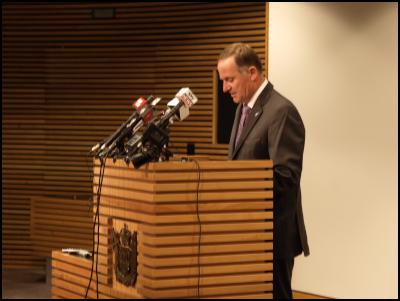
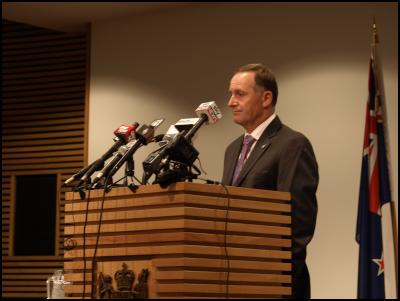
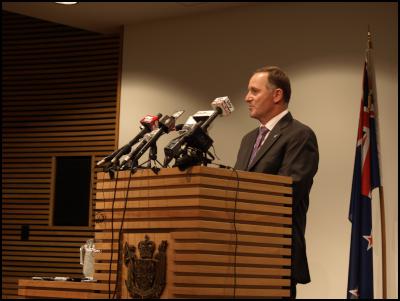
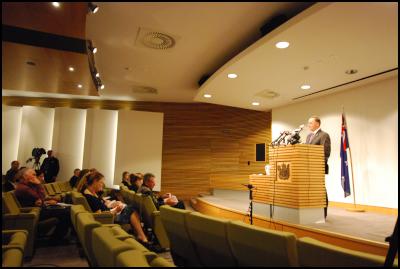
Click for big version.



 Ian Powell: Why New Zealand Should Recognise Palestine
Ian Powell: Why New Zealand Should Recognise Palestine Binoy Kampmark: Squabbling Siblings - India, Pakistan And Operation Sindoor
Binoy Kampmark: Squabbling Siblings - India, Pakistan And Operation Sindoor Gordon Campbell: On Budget 2025
Gordon Campbell: On Budget 2025 Keith Rankin: Using Cuba 1962 To Explain Trump's Brinkmanship
Keith Rankin: Using Cuba 1962 To Explain Trump's Brinkmanship Binoy Kampmark: The Killing Of Israeli Embassy Staffers - Netanyahu’s Antisemitism Canard
Binoy Kampmark: The Killing Of Israeli Embassy Staffers - Netanyahu’s Antisemitism Canard Keith Rankin: Zero-Sum Fiscal Narratives
Keith Rankin: Zero-Sum Fiscal Narratives